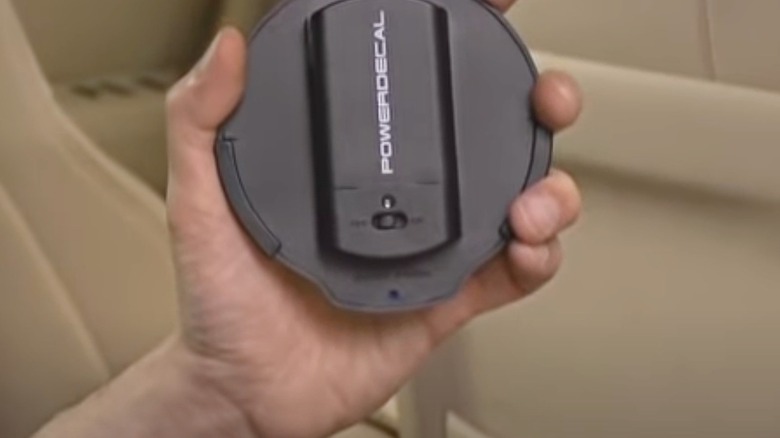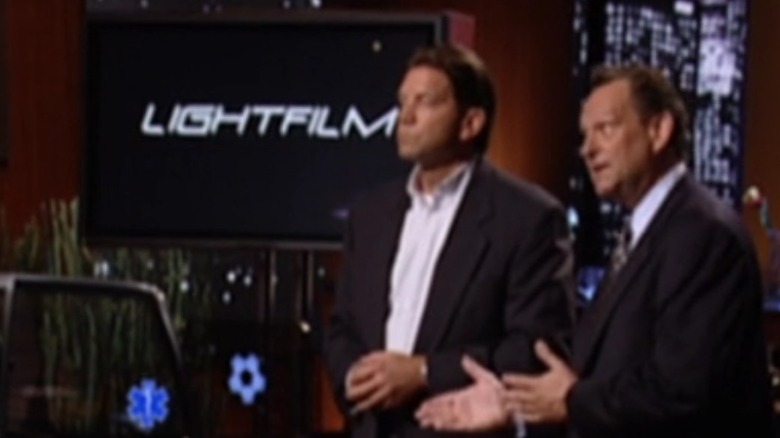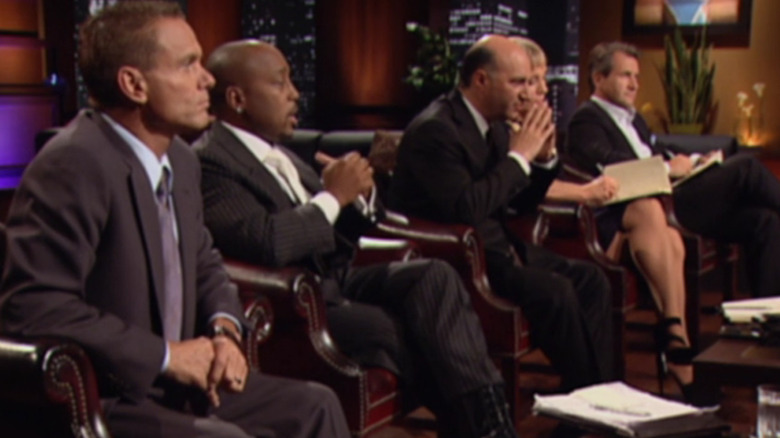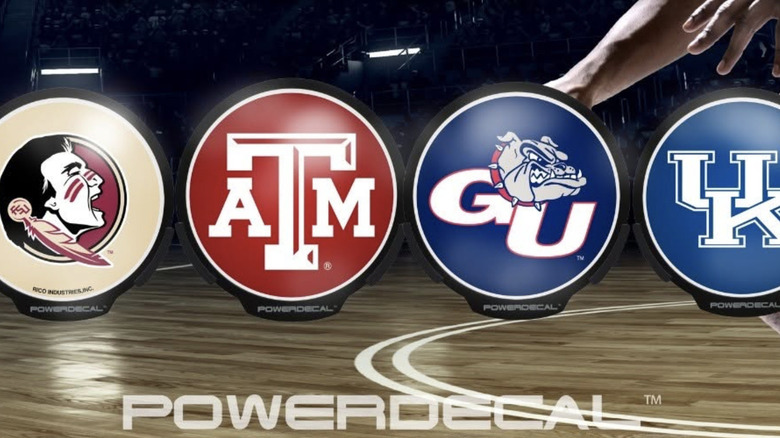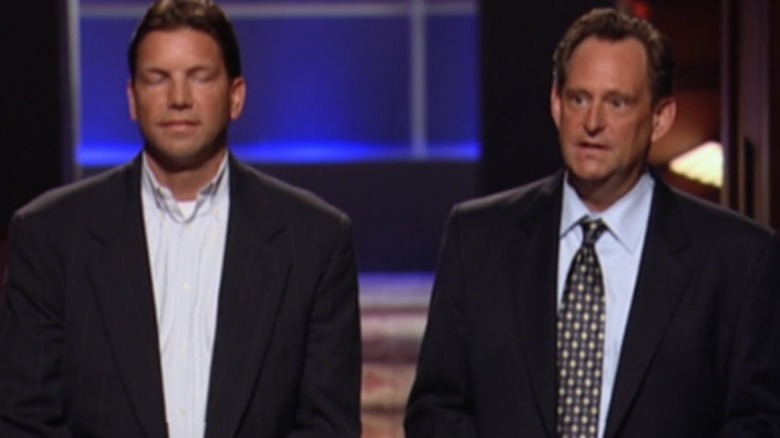What Happened To Power Decal From Shark Tank Season 2?
Decals are a good way to show support for a cause, group, sports team, or brand. They can be placed on the hood, sides, bumper, and even windows — or on parts where they can be prominently seen by other motorists and pedestrians, especially when they bear an important message. However, when improperly installed or removed, decals can damage the car. There's also an issue with their visibility at night since not all come with reflective material.
Interestingly, there's this brand called Power Decal that offers a unique type of LED-backlit decals, which are easy to attach to car windows, adding a visual impact while maintaining a clean exterior. Their decals also automatically turn on and off depending on whether the car is moving or not. Furthermore, they illuminate brightly at night, so they are always visible in low-light conditions.
Long before Power Decal became a staple at Best Buy stores, the people behind it were struggling to kickstart the business. They tried their luck at securing an investment via ABC's business reality TV series "Shark Tank" and, after landing a deal and gaining popularity among viewers, worked on improving its product before officially launching in 2014.
What happened to Power Decal on 'Shark Tank'?
When business partners Rolf Schwarz and George Podd appeared in "Shark Tank" Season 2, they were in the process of finalizing a product under a prospective brand name called Light Film. Their pitch was for motion and light-sensitive decals for car windows. Their concept was unique and promising at the time, but since they were still in a developmental phase, the Sharks had doubts that the project could lead somewhere.
Schwarz and Podd came on the show asking for a $100,000 investment in exchange for a 5% equity stake. They needed the money to take the project to the next level after investing $750,000 of their own money in patent applications and legal advice. Aside from developmental funding, they were looking to gain help in marketing and distributing their product.
After presenting their business idea, Kevin O'Leary and Kevin Harrington quickly rejected the offer, thinking more money was needed to make it work. Robert Herjavec asked about their sales. When Rolf and Podd told him they needed the funding to start making sales, Herjavec questioned if they had potential licensing deals. Herjavec continued to show interest but decided to bow out after realizing that O'Leary and Harrington might be right.
Barbara Corcoran inquired about production cost and selling price, to which the business partners responded that each product cost $5 to make, but they were planning to sell them for $19.99 each, depending on licensing. However, she believed she was not the right partner for the business, so she was out, leaving Daymond John as the sole remaining Shark.
John was a good fit for the project since he has connections in distribution and licensing. He was interested in Light Film and was willing to give the partners the $100,000 they asked for upfront. He was also willing to work with them long-term and provide more financing for future orders. However, he wanted 75% of the company. Podd and Schwarz tried negotiating with $750,000 for a 51% stake, prompting Herjavec to team up with John. The two Sharks offered $100,000 and unlimited financing in exchange for 70%. John also told the pair they would get 75% of the profits until they could recoup their $750,000 initial investment. The two then accepted the deal.
Power Decal racks up licensing deals with the help of two Sharks
When Podd and Shwarz appeared on "Shark Tank" in 2011, their product still had a power cord, which meant it needed an electrical source from within the car. They did say they were developing battery-operated ones, and the business partners must have taken time to fulfill their word because when Light Film officially launched in 2014, it was already battery-operated. The company was also rebranded into Power Decal.
Partnering with John and Herjavec proved beneficial, as the pair quickly acquired licensing deals with sports franchises and more than two hundred colleges. Power Decal also produced themed designs for EMS, the military, and many brands. Additionally, the company started accepting custom designs for wholesale orders that start at $16.45 per unit for 240+ decals and go as high as $19.95 per unit for a minimum of 60.
Since securing an investment with two Sharks, Shwarz and Podd struck deals with retailers to ensure their product's visibility in mainstream stores. The products of the Chicago, Illinois-based company are available at Best Buy and other gift retailers around the U.S. Within the first two years of its operation, the firm's yearly sales reportedly jumped from $100,000 to more than $1 million, according to Shark Tank Success.
Power Decal thrives after the show
Having someone like Podd, an industrial designer and inventor, on board is a big advantage for the company. The improvements in the product's design are significant and executed well. Aside from the inclusion of batteries, newer versions of the Power Decal come with motion sensors, so they would light up when the car is running but switch off when parked or stationary for two minutes.
Another improvement is how easy and clean its installation has become. Without using special tools, car owners could install Power Decals with the mounting clips that come with the product. The clips already have 3M VHB adhesion strips, so installing takes seconds once the back paper has been peeled off. The backlit decal is also removable from the clips, making it easier to clean from time to time.
Despite the saturated car accessories market, Power Decal quickly established itself in the industry because of its innovative design and technology. Moreover, its widespread availability helped the brand reach more customers. Aside from retailers, Power Decal now sells its products online, including on Amazon. In July 2021, the company averaged more than $1 million in annual revenue. As of September 2024, Power Decal's net worth is estimated to be $2.5 million.
What's next for Power Decal and its co-founders?
Power Decal never stopped innovating, either. While the decision to equip the decals with batteries proved better than the wired setup, the company is now exploring solar power options for a more eco-friendly production that extends the use of batteries and reduces waste. When realized, this could pave the way for more growth for the business since green and sustainable products are in higher demand in recent times.
However, Schwarz would no longer be able to witness Power Decal's growth from here on out. The co-founder, who was introduced on "Shark Tank" as a financial manager, left the firm in 2015, based on his updated LinkedIn profile. He focused on marketing and development when he was still with Power Decal and moved on to other projects after his departure. According to his profile, he is currently involved in two businesses: one is a construction capital company, while the other is a manufacturer of walking stuffed toys that do not require batteries.
On the other hand, Podd, who has an inactive LinkedIn account, is presumed to still be at Power Decal. He does not have a social media presence, but he has filed several patents for different inventions with the United States Patent and Trademark Office (USPTO). It's not clear if he worked again with Schwarz to come up with the walking plush toy, but he has filed a USPTO patent with the same technology in mind. He has also come up with several ideas on how to enhance pizza dough crust consumability. Between 2017 and 2018, he helped develop a modification of the selfie stick, which is now an official product called SlimSelfie.
